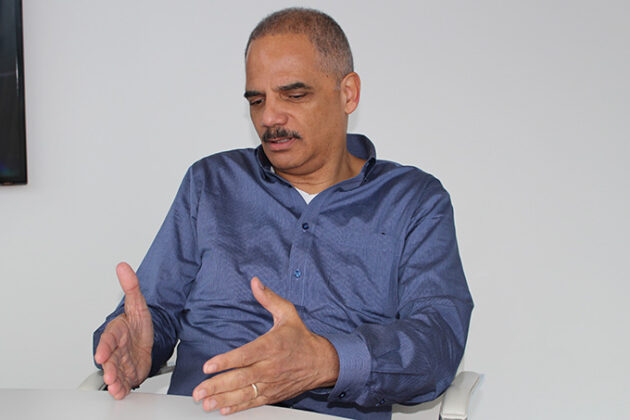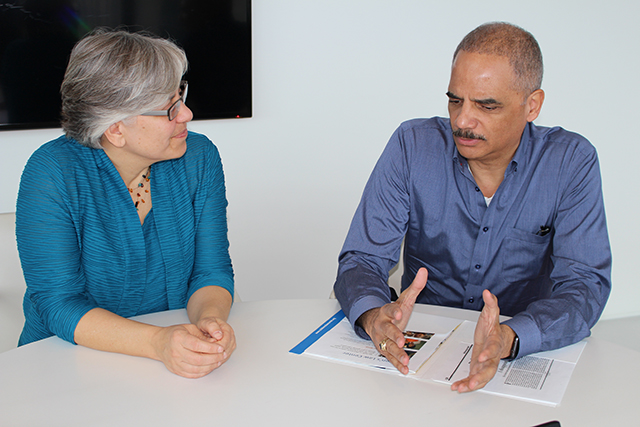Eric Holder: A Government that Doesn’t Focus on Children Isn’t Doing its Job

Former US Attorney General Eric Holder had a front-row seat to how tough it was to grow up in 1990s DC, the decade when Children’s Law Center was founded.
Holder saw many kids in his courtroom during his time as a judge in DC Superior Court. He then served as US Attorney for the District of Columbia before moving on to the Justice Department.
In the 1990s, DC was “struggling to get a handle on the violence” in the streets and in homes, Holder recalls.
Despite the violence and trauma many children experienced, Holder remembers it as a time when judges had few resources to help young people.
“There was little to no recognition of the issues [these kids] faced. There was little recognition of the school-to-prison pipeline. There was this emphasis on zero tolerance. But then you looked at the pre-sentence report on someone and there was almost always a neglect case involving the same kids,” he says.
“As a judge you saw the connection but there were no tools to deal with the unique issues that children faced.”
Holder is a longtime friend to Children’s Law Center and was honored with our Distinguished Child Advocate award in 2009. He sees the organization as one of the earliest advocates for a more comprehensive approach to solving problems in children’s lives.
“You used to be a lone voice in DC,” he says about Children’s Law Center. “There weren’t many of you. I remember sitting at the lunch table with the other judges saying, we don’t have enough resources to help children here, and most of the services were out of state and very expensive.”
Holder’s experiences in the courtroom influenced his priorities while working as the US Attorney for DC, including starting the domestic violence unit.
“There was a lot of resistance at the time to focusing on domestic violence,” he says. “People thought, ‘why should domestic violence cases be singled out above other types of assault?’ But I learned that there were so many collateral impacts with domestic violence within families, especially on children,” he says.
The ability to make change happen at the local level made the US Attorney job “the best job I’ve ever had,” Holder says.
Fast forward to today. Holder is now a partner at the Covington law firm, where he has been since he left his role as US Attorney General in 2015.
Looking back on the past 20 years, Holder believes DC – and courtrooms across the country – are beginning to turn the corner when it comes to support for vulnerable children and their families.
“We have a more enlightened approach, where we keep families involved. It’s a critical part of the successful outcomes we’re seeing. We didn’t have the ability to do that 20 years ago, not in any meaningful way,” he says.

Part of the shift within the judicial system has been the result of increasing consensus about how violence and trauma impact children.
“The studies show some really surprising things. We know that kids exposed to violence are more likely to struggle in school, more likely to engage in violence, but then, surprisingly, studies show they are also more likely to be a victim again,” he says.
Holder believes that realization has led to greater urgency to support child witnesses of violence and other at-risk kids.
“Leaders have to recognize what our youth are being exposed to and the impact on our community. If you spend relatively little money early on to help children, you save so much later on,” Holder says.
That’s also why organizations like Children’s Law Center are critical, he says.
“You’ve grown from a fledgling, well-intentioned concept 20 years ago to a full scale reality today, and [have] had pretty substantial impact on the city,” he says.
Despite the progress he’s seen over time, Holder cautions the fight is far from over. For one, there is a lack of legal help for far too many families who face life-altering decisions in family court.
“Gideon was a seminal case [that established the right to counsel] for criminal matters, but we often ignore the need on the civil side when life-changing matters are being decided. I saw that as a judge all the time…The numbers of people who are not represented in crucial, life-changing decisions in court are just shocking,” Holder says.
“This is a time to talk about marrying up the civil side [of judicial matters] to Gideon,” he says.
Holder also urges leaders to stay focused on meeting the needs of at-risk children.
“I think we are fundamentally in a different place than we were 20 years ago. The city is a better place than it was, and I think a part of that is that we invested time, resources and energy in our young people,” he says.
This investment must continue.
“A government that doesn’t have children as its primary focus is not doing its job, or not doing its job well. Kids are our future and how we treat them will determine what kind of Washington, DC we’re going to have 15 or 20 years from now,” Holder says.
At Children’s Law Center, we couldn’t agree more. And we are proud to have Eric Holder help us celebrate our 20th anniversary as an honorary co-chair of our upcoming Helping Children Soar Benefit in September.